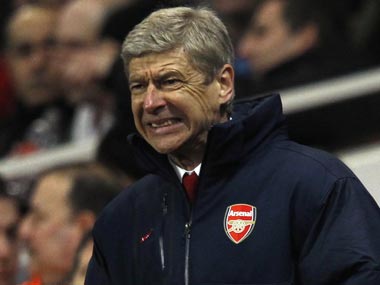If insanity really does consist of doing the same thing over and over and expecting different results, Brendan Rodgers and Arsene Wenger can probably expect to be sectioned later this week. At Anfield on Sunday, Liverpool and Arsenal both showcased their characteristic fatal flaws as they once again indicated why they cannot be expected to challenge seriously for the title any time soon. [caption id=“attachment_1823803” align=“alignleft” width=“380”]  Arsenal manager Arsene Wenger. Reuters[/caption] For the hosts, the familiar foes of failing to defend set-pieces and frustrating profligacy reared their ugly heads, while, for the visitors, a lack of leadership and a worryingly soft centre left the London side bemoaning the loss of two points late on. It is almost impossible to comprehend the fact that Liverpool and Arsenal were setting the Premier League pace this time last season. Back then, both were upsetting the majority of the informed pre-season predictions with vibrant brands of attacking football which were married with a winning mentality that hid their long-standing flaws. Fast forward 12 months and they find themselves 17 and 12 points off top spot respectively, with aspirations of serious title tilts cast aside for at least another eight months. Most likely even longer. Liverpool’s defensive deficiencies are long-standing and well-known, but the impact of such inadequacy has been exacerbated by their new-found impotence at the other end this term. After 17 games last season they had scored 42 times; they have netted exactly half of that total this time round. And while those at Liverpool have taken turns to bemoan the loss of Luis Suarez and the injury-enforced absence of Daniel Sturridge, Rodgers has at least sought to restore the attacking verve that characterised his dazzling group of swashbucklers last term by turning to a 3-4-3 formation, with Raheem Sterling nominally deployed as a centre-forward. It isn’t the first time Rodgers has shown his pragmatic side; he utilised a three-man defence last season to elicit the best from Daniel Sturridge and Luis Suarez as a strike partnership. The use of Sterling in a more advanced central role, while flanked by Adam Lallana and Philippe Coutinho, allows Liverpool, in Rodgers’ own words, to “press” and to fashion a “more aggressive game”. And although the tactical reshuffle, which was first aired in the 3-0 defeat at Manchester United last week, is still yet to yield a Premier League win, Sunday’s draw showed signs that Liverpool haven’t forgotten all of their good habits. As they did at Old Trafford, Liverpool were able to craft out chances – they managed 27 shots in all, having struck 19 in their defeat at the other end of the M62 – but they were stung by their opposition’s ruthless ability to capitalise on their defensive weakness. United scored with their first three shots on target last weekend and Arsenal were just as clinical. When Olivier Giroud, who had the freedom of Liverpool’s penalty box, swept the ball through Brad Jones’ legs to cap an excellent flowing team move, he also recorded Arsenal’s second shot on target and extended their remarkable run of efficiency – all of their previous six shots on target in the Premier League had resulted in a goal, a run stretching back to their first goal in the 4-1 win against Newcastle. Mathieu Debuchy’s earlier equaliser, which had come completely against the run of play, was the third goal Liverpool had conceded from a set-piece situation this season. No other Premier League team have let in more goals of this type. How often can such indiscretions be labelled as mistakes without being deemed as symptomatic of a genuine coaching problem? But in keeping with the erratic nature of the match, Arsenal allowed Liverpool to profit from their weaknesses too. Coutinho, who had run at Arsenal’s back four time and time again in the opening period, snuck into the space that was supposed to have been guarded by Mathieu Flamini to put Liverpool in front in the 45th minute. Flamini was, in theory, employed as Arsenal’s sole holding midfielder, but he was frequently caught out of position, especially in the first half, and offered little protection to his back four. Liverpool’s sense of verve dissipated as the game wore on and Rodgers, hamstrung by the summer work of his transfer committee, threw on Rickie Lambert and Fabio Borini, as he looked for an equaliser via Plan B. Plan B bore no fruit - Lambert toiled to no avail, while Borini foolishly accumulated two yellow cards – but fortunately for Rodgers, Arsenal were willing participants in Liverpool’s quest for parity. With six of the nine allotted minutes of injury-time already played, Liverpool were awarded a corner kick. Per Mertesacker, with the captain’s armband affixed to his bicep, curiously allowed Martin Skrtel a run on the ball and instinctively ducked out of the way after the Slovakian had connected with the it, leaving goalkeeper Wojciech Szczesny powerless as he watched the header arrow its way into the back of the net in front of the Kop. Character was the word Rodgers’ attributed to the procurement of his side’s salvaged point - cowardice is surely the one that will spring to mind when Wenger ruminates over why his side departed Merseyside with two points dropped.
If insanity really does consist of doing the same thing over and over and expecting different results, Brendan Rodgers and Arsene Wenger can probably expect to be sectioned later this week.
Advertisement
End of Article


)

)
)
)
)
)
)
)
)



